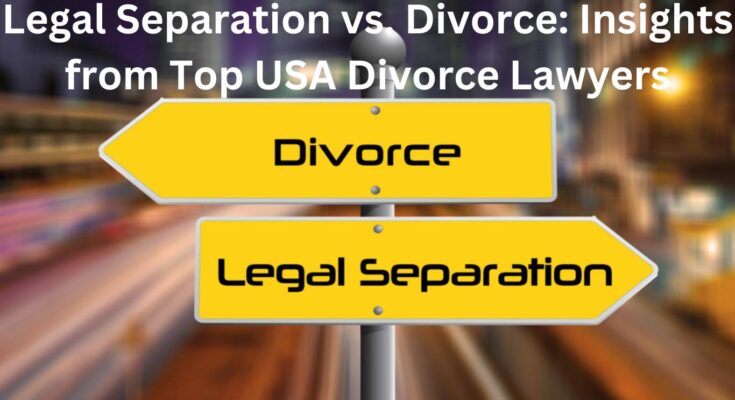Divorce and legal separation are two legal processes that individuals may consider when their marriages are no longer working. While both options allow for a separation of spouses, they differ in terms of legal status, financial implications, and emotional outcomes. Divorce lawyers in the USA offer invaluable insights into which option might be best suited for different situations, based on the unique needs and goals of their clients.
In this article, we will explore the key differences between legal separation and divorce, provide advice from top divorce lawyers, and highlight when one might be more appropriate than the other.
What Is Legal Separation?
Legal separation is a formal process where a married couple decides to live apart while still maintaining their marital status. Unlike divorce, the couple remains legally married but agrees on key issues like child custody, financial responsibilities, and division of property.
Key Features of Legal Separation
- Marital Status Remains Intact: The couple is still legally married but has a formal separation agreement.
- Financial Arrangements: Both spouses may continue to share certain financial responsibilities, such as joint debts or health insurance.
- Custody and Child Support: Legal separation allows for agreements on child custody, visitation, and support without formally ending the marriage.
- Possible Reconciliation: The marriage can be resumed at any time, as the couple remains legally married during the separation.
- Religious Considerations: Some individuals may prefer legal separation due to religious beliefs that oppose divorce.
Benefits of Legal Separation
- Time to Reevaluate: Legal separation provides time to reflect on the marriage and potentially work toward reconciliation without the finality of divorce.
- Preservation of Benefits: In some cases, individuals may retain certain benefits such as health insurance through their spouse’s plan.
- Avoids the Stigma of Divorce: For those who wish to avoid the social or personal stigma associated with divorce, legal separation offers a middle ground.
What Is Divorce?
Divorce is the legal dissolution of a marriage, which means that both spouses are no longer legally married. The divorce process involves the division of marital property, determination of child custody, and settlement of financial matters.
Key Features of Divorce
- End of Marriage: Divorce officially ends the marriage, making both spouses legally single.
- Finality: Once a divorce is finalized, the spouses are free to remarry if they choose.
- Legal and Financial Separation: Divorce involves a clear division of assets, liabilities, and responsibilities.
- Custody and Support: Child custody, visitation, and support arrangements are determined during the divorce process.
Benefits of Divorce
- Emotional Closure: Divorce provides a clean break, allowing both individuals to move on with their lives.
- Clear Financial Separation: Divorce clearly defines the division of marital property, including assets, debts, and spousal support.
- Freedom to Remarry: Once the divorce is finalized, both parties are free to marry again if they wish.
Legal Separation vs. Divorce: Key Differences
| Aspect | Legal Separation | Divorce |
|---|---|---|
| Marital Status | Married but legally separated | Legally divorced |
| Possibility of Reconciliation | Yes, the couple can resume the marriage | No, the marriage is permanently ended |
| Financial Division | No final division of assets or debts | Final division of assets and liabilities |
| Child Custody & Support | Settled during separation, but marriage continues | Finalized during divorce process |
| Emotional Impact | Less final, leaving room for reconciliation | Provides closure and finality |
| Health Benefits | May retain spouse’s health insurance coverage | Health insurance may be affected |
| Time Commitment | Can be quicker than divorce | Can take longer, depending on the complexity |
| Cost | Generally less expensive than divorce | Can be more expensive, especially if contested |
When Should You Consider Legal Separation?
Legal separation may be a suitable option for couples who are experiencing challenges but are not yet ready to completely end their marriage. Some common reasons for choosing legal separation include:
- Religious Beliefs: Individuals whose faith prohibits divorce may opt for legal separation instead.
- Uncertainty About Divorce: Couples who need time apart to decide whether they want to continue the marriage can use legal separation as a temporary solution.
- Health or Financial Benefits: One spouse may wish to maintain health insurance or other financial benefits that are available through the marriage.
- Separation Without Divorce: Some couples prefer the idea of legally living apart but not severing the marriage, either for personal or financial reasons.
When Should You Consider Divorce?
Divorce is often the best option for individuals who are sure they no longer want to be married. Here are some common scenarios when divorce is the preferred choice:
- Irreconcilable Differences: When the relationship has deteriorated beyond repair and reconciliation is no longer possible.
- Desire for Closure: Individuals who need emotional closure and are ready to move forward with their lives may opt for divorce.
- Complex Financial or Custody Issues: When there are significant assets to divide, or complex custody and support issues that need to be addressed, divorce may be necessary to finalize the arrangement.
- Abuse or Neglect: If the marriage involves domestic abuse or emotional neglect, divorce is often the necessary step for the safety and well-being of the parties involved.
Insights from Top Divorce Lawyers in the USA
Top divorce lawyers in the USA often advise their clients to carefully weigh the pros and cons of legal separation and divorce, taking into consideration their personal and financial circumstances. Here’s some expert advice:
1. Consider the Emotional Impact
While legal separation may offer temporary relief, divorce provides a final emotional resolution. Divorce lawyers often recommend clients choose divorce when they are certain they want to end the relationship and move forward with their lives.
2. Evaluate Financial Needs
In cases where health insurance, social security benefits, or tax considerations are important, legal separation may be a better option. However, divorce lawyers caution that staying in a marriage solely for financial benefits can lead to long-term dissatisfaction.
3. Understand the Legal Process
Both legal separation and divorce involve legal proceedings, but divorce can be more complex due to the finality of the process and the need to divide assets. Divorce lawyers help clients understand which option best suits their long-term goals and needs.
Conclusion
Choosing between legal separation and divorce depends on various factors, including personal preferences, financial considerations, and emotional readiness. Divorce provides finality and a clear path to moving on with life, while legal separation offers a temporary solution that leaves room for reconciliation. It’s essential to consult with a skilled divorce lawyer who can provide personalized advice and help you navigate the complexities of either process.




